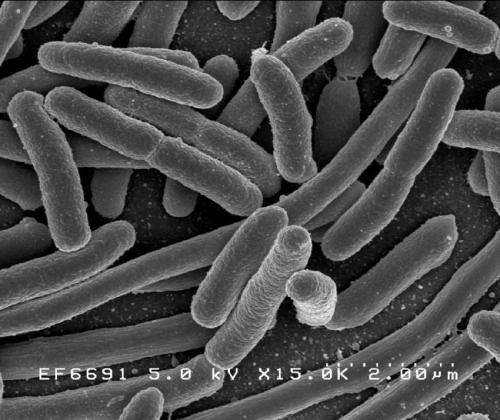A new study suggests that E. coli from meat products may be responsible for hundreds of thousands of urinary tract infections in the U.S. each year.
A team of scientists, led by Lance Price and Cindy Liu from the George Washington University Milken Institute School of Public Health, developed a new genomic approach for tracking the origins of E. coli infections. Using this method, the team estimated that between 480,000 and 640,000 urinary tract infections in the United States each year may be caused by foodborne E. coli strains. The study, “Using source-associated mobile genetic elements to identify zoonotic extraintestinal E. coli infections,” was published online March 23 in the journal One Health.
“We’re used to the idea that foodborne E. coli can cause outbreaks of diarrhea, but the concept of foodborne E. coli causing urinary tract infections seems strange—that is, until you recognize that raw meat is often riddled with the E. coli strains that cause these infections,” said Price, a professor of environmental and occupational health and director of the GW Antibiotic Resistance Action Center who formerly was a researcher at Northern Arizona University. “Our study provides compelling evidence that dangerous E. coli strains are making their way from food animals to people through the food supply and making people sick—sometimes really sick.”
E. coli is far and away the most common cause of urinary tract infections, causing upward of 85% of cases each year. Women are at greater risk of developing UTIs, which can range from simple bladder infections to life-threatening bloodstream infections.
E. coli can live in and infect people and animals, including animals raised for meat in the U.S. When food animals are slaughtered, the bacteria that inhabit their guts—including E. coli—can contaminate the meat products and put people at risk for exposure.
Data from the U.S. Food and Drug Administration (FDA) suggests that a majority of raw meat products are contaminated with E. coli. Currently, only specific types of diarrhea-causing E. coli, such as E. coli O157:H7, are monitored with any seriousness in the U.S., but this new research suggests that other strains may also pose serious health risks.
In this study, the researchers collected raw chicken, turkey and pork purchased from major grocery store chains in Flagstaff and isolated E. coli from these meat samples. At the same time, the researchers, who began the project while employed at NAU’s Pathogen and Microbiome Institute (PMI), collected urine and blood E. coli isolates from patients hospitalized at Northern Arizona Healthcare’s Flagstaff Medical Center for urinary tract infections.
By analyzing the genomes of E. coli from meat and those from people, the research team identified segments of E. coli DNA unique to strains that colonize food animals versus humans, then developed a new predictive model to differentiate E. coli from the two sources.
Previous work by the same team, investigating a single sequence type of E. coli, had linked contaminated meat to urinary tract infections. In the latest study, the team used their new predictive model to look at all E. coli sequence types and showed that about 8% of E. coli urinary tract infections in the Flagstaff area could be attributed to meat.
Scaling from Flagstaff to the U.S. population overall, suggests that foodborne E. coli may cause hundreds of thousands of urinary tract infections across the U.S. every year, the researchers note.
“This unprecedented study design, based upon intensive food sampling of an isolated community and the engagement of their dominant healthcare provider, is a powerful approach to public health research,” Paul Keim, a professor of microbiology at Northern Arizona University and co-author of the study, said. “The study design, along with advancements in genomic technologies, allowed us to establish the linkages between food sources and the clinical cases. The conclusions from this model situation will affect public health practices worldwide.”
The foodborne E. coli strains identified in the current study were not only associated with urinary tract infections but were also capable of causing serious kidney and bloodstream infections. Left unchecked, E. coli bloodstream infections can be deadly. It is estimated that between 36,000 and 40,000 people die from E. coli bloodstream infections in the U.S. each year, but it is currently not known what portion of these originate from foodborne exposures.
“People often dismiss bladder infections as minor annoyances, but the bladder is a major gateway to patients’ kidneys and bloodstream,” said Liu, associate professor of environmental and occupational health co-director of the GW Antibiotic Resistance Action Center and former researcher at PMI. “People over 55 and vulnerable populations such as cancer and transplant patients are at the highest risk for life-threatening blood infections, but young, healthy people are also at risk.”
The study suggests producers and the FDA could do a better job of monitoring potentially dangerous pathogens in food, most notably raw meat sold in grocery stores throughout the country. At the same time, consumers can take steps to limit their exposure to contaminated food. For example, home cooks should wash their hands carefully when preparing or handling raw meat and use separate surfaces to prepare raw and cooked foods, the authors say.
More information:
Cindy M. Liu et al, Using source-associated mobile genetic elements to identify zoonotic extraintestinal E. coli infections, One Health (2023). DOI: 10.1016/j.onehlt.2023.100518
Citation:
Bacteria from meat likely to cause more than a half-million urinary tract infections in the US every year (2023, March 24)
retrieved 26 March 2023
from https://medicalxpress.com/news/2023-03-bacteria-meat-half-million-urinary-tract.html
This document is subject to copyright. Apart from any fair dealing for the purpose of private study or research, no
part may be reproduced without the written permission. The content is provided for information purposes only.


